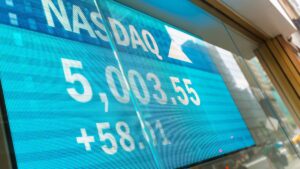Mass-produced, low-cost, mid-size electric cars are almost here: McKinsey

Tesla's very cool Model X electric car with falcon wing doors. Pic: Getty
Car makers are on the verge of mass market production of electric cars according to a new report from consultant McKinsey & Co.
That’s good news for producers of metals such as lithium, cobalt and nickel (used in batteries), aluminium (used to build lighter car chassis) and copper (used in batteries, electric motors and charging stations).
Producers of other metals such as graphite and manganese may also benefit on a smaller scale.
More than 100 new models of electric car are expected on sale by 2024, reports McKinsey in a research note that examines mass-market production of electric cars (or EVs).
McKinsey now believes EV sales could account for a third of passenger vehicle sales in major markets like China, Europe and the US — or up to a quarter of total global sales — by 2030.
That compares to a market share of just 1 per cent in 2017 — or about 1.3 million EVs.
> Battery metals look a sure thing as car makers lock in long-term contracts
> Cobalt price to rise, supply tighten as China snaffles a third of the world’s supply
> How electric cars are driving copper – and which stocks are winning
Electric car makes are now focused on extending the range of EVs — which is the key to mass market acceptance, lower prices and therefore mass production.
The magic number for range is 300km, McKinsey believes.
“We find that once the average range of our set of benchmarked EVs has surpassed 300 kilometres, [car makers] seem to be able to concentrate on entering lower-price segments while keeping range up.
“This indicates that the long-awaited EV volume segment — ‘midsize EVs for the masses’ — may be on the verge of becoming reality.
“Moving away from previous ‘niche roles’ such as high-performance sports or mid-range city cars, there will be a sizable share of midsize and volume-segment vehicles among the many new models.”
> Bookmark this link for small cap breaking news
> Discuss small cap news in our Facebook group
> Follow us on Facebook or Twitter
> Subscribe to our daily newsletter
UNLOCK INSIGHTS
Discover the untold stories of emerging ASX stocks.
Daily news and expert analysis, it's free to subscribe.
By proceeding, you confirm you understand that we handle personal information in accordance with our Privacy Policy.








